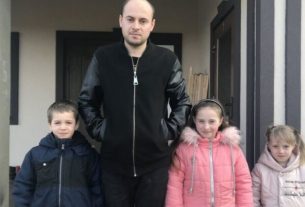Anna stood at the kitchen window, watching raindrops slowly trickle down the glass. Behind her came the familiar hiss of the frying pan—dinner for two was on the stove. For her and Mikhail. As usual. Like every day for the last eight years of their married life.
“Anya, we need to talk,” her husband said, his voice serious.
She turned. Mikhail sat at the kitchen table, his phone lying in front of him, his gaze fixed somewhere off to the side. Anna knew at once the conversation would be unpleasant. Over the years of marriage she had learned to read him by the tiniest signs: the way he avoided a direct look, the tension in his shoulders, the habit of drumming his fingers on the tabletop.
“I’m listening,” she said shortly, switching off the stove.
“I called Mom yesterday. She’s complaining about her health again. Her blood pressure spikes, her heart bothers her. And at their clinic there’s only a paramedic left—the doctor quit a month ago. It’s forty kilometers to the district center by bus, and it runs twice a week.”
Anna sat down opposite him in silence. She knew where this was heading. They had discussed the subject more than once, and every time it ended the same way—with nothing.
“Mikhail, we’ve talked about this. Your mother is used to her home, to her neighbors. Her whole life is there.”
“What life?” he cut her off sharply. “Loneliness and illness? Anya, she’s sixty-eight. She needs care, proper medical attention. We’ve got a good clinic here, a hospital nearby. And we can look after her.”
Anna sighed. Valentina Petrovna was indeed no longer young, but her temperament was… particular. Authoritative, demanding, intolerant of objections. During her rare visits, her mother-in-law unfailingly criticized everything—from how soup was cooked to the way the furniture was arranged. Anna remembered last year’s visit, when for three days straight Valentina Petrovna rearranged the dishes in the kitchen cabinets, insisting that “order has to be the right kind.”
“Misha, I understand your concern for your mother. But be realistic—it will be very hard for us to live all together. Your mother is used to being mistress of her own house. And this apartment is mine. I grew up in it; my parents lived here. You know what she’s like.”
Mikhail frowned. He didn’t like being reminded that the apartment had been her inheritance from her parents. Although officially he was only registered here, it still wounded his pride.
“Anya, she’s my mother. She raised me alone after my father died. Worked two jobs so I could get an education. And now, when she needs help, am I supposed to turn my back on her?”
“I’m not saying turn your back. But there are other options. We could hire a caregiver, help financially, visit more often…”
“A caregiver? With what money? You know what that costs. And we can’t support two households.”
Anna stood and began clearing the table, though they hadn’t even eaten. She needed to do something with her hands to manage the rising irritation.
“Mikhail, let’s be honest with each other. You earn quite well. You’re a deputy director at the plant, you get bonuses. If it’s so important to you that your mother be looked after, you can rent her an apartment closer to us. Or move to her village.”
“What?” Mikhail sprang to his feet. “You’re suggesting I quit my job and move to the back of beyond? What about our life? My career?”
“And what about my life?” Anna shot back. “I work too. I have plans too. We wanted a child, remember? Or do you think having your mother in the house will make that easier?”
A heavy silence fell. The topic of children was painful for both of them. Three years earlier Anna had suffered a late-term miscarriage. After that they tried again, but without success. The doctors said there needed to be less stress, a calm atmosphere at home.
“Anya,” Mikhail’s voice softened, “Mom won’t get in our way. She’ll help with the housework, with the baby when we have one…”
“Help?” Anna gave a bitter smile. “Misha, in all the years of our marriage your mother hasn’t approved a single one of my decisions. She thinks I cook wrong, clean wrong, dress wrong. She still refers to me only as ‘her,’ and it’s been eight years. What kind of help is that?”
“She’s just… conservative. She’ll get used to it in time.”
“Eight years isn’t enough to get used to it?”
Mikhail turned to the window. Dusk was thickening outside, the streetlights coming on. Somewhere far off a train hooted—the very one that could bring his mother from the village.
“I can’t leave her there alone, Anya. I can’t.”
There was pain in his voice, and Anna’s heart quivered. She knew how deeply Mikhail loved his mother despite all her faults. Valentina Petrovna had indeed been a good mother—strict but fair. She gave her son an education, instilled the right values. But as a mother-in-law she was terrible.
“All right,” Anna said quietly. “Let’s go over all the possible options once more. Maybe we’ll find a compromise.”
The following weeks passed in endless conversations that led nowhere. Every day Mikhail called his mother and listened to complaints about her health, her loneliness, the difficulties with medical care. And in the evenings he tried to convince his wife that his mother needed to move in with them.
“Anya, she fell last week. It was lucky the neighbor noticed. What if she hadn’t? She could have lain there all day.”
“Mikhail, there are special bracelets with a panic button. We can install security cameras.”
“That’s not a solution. She needs constant care.”
“Then hire a caregiver.”
“With what money? A good caregiver costs about a third of my salary.”
“So your mother isn’t worth a third of your salary?” Anna asked, stinging.
“Don’t twist my words. It’s just an unreasonable expense when we can look after her ourselves.”
“We? Or me?”
Mikhail fell silent, realizing she was right. In their family, household chores traditionally fell on the woman’s shoulders. He worked, provided for the family, and she ran the house. And if his mother moved in, most of the care would fall on Anna as well.
“You don’t work full-time,” he tried to justify himself. “You have time.”
“I work part-time at the library because we were planning a child. I’m supposed to be home, preparing for pregnancy, taking care of my health. And now you want me to take care of your mother as well?”
“She’s not disabled. She just needs someone nearby.”
“Mikhail,” Anna sat beside her husband on the couch and took his hands in hers, “please understand me. I’m not against your mother. But I’m looking at the situation realistically. The two of us won’t be able to coexist peacefully in one apartment. It will lead to constant conflict. We’ll all suffer—you and I, and she will too.”
“Maybe you just haven’t learned to understand each other yet?”
“In eight years?”
Mikhail pulled his hands free. He felt that his wife refused to grasp the gravity of the situation. His mother needed help, and the one person closest to him was refusing to provide it.
“You know what, Anna, I’m tired of these endless arguments. The decision is made. Mom is miserable there, and she’s moving in with us. Period.”
“What do you mean, ‘the decision is made’? We were discussing—”
“We’ve been discussing it for a month. You come up with a thousand reasons against it, but not a single real solution. Meanwhile, Mom could fall seriously ill or get into trouble. I can’t allow that.”
Anna felt herself boiling inside. For a month she had patiently explained, offered alternatives, looked for compromises. And in the end he simply presented her with a fait accompli.
“And when is this move scheduled?” she asked coldly.
“Next week. I’ve already arranged with some guys, they’ll help move her things. We’ll clear out the spare room for her and she’ll settle there.”
“The one with the TV?” Anna stood up. “That’s where I work. My computer is there, my books, my documents.”
“You’ll move them to the bedroom. We’ll make room.”
“Mikhail, do you hear yourself? You’re treating my apartment like it’s your own. You don’t ask my opinion, you don’t consider my needs.”
“This is our home, Anna. Our home together.”
“No,” she said quietly but very distinctly. “This is my home. The apartment is in my name, I pay the utilities, I did the renovations with the money from selling my mother’s jewelry. You’re registered here, but that doesn’t make you the owner.”
Mikhail paled. Anna had never spoken so bluntly before. Yes, formally the apartment was hers, but he had thought of it as their shared home. They were a family, husband and wife.
“So you’re ready to throw my sick mother out on the street over some formalities?”
“I’m ready to defend my home from intrusion. If you think your mother matters more than my opinion and my comfort, then draw your conclusions.”
“What conclusions?”
“Rent an apartment for yourself and your mother. You earn enough. Live as you wish, take care of each other. But without me.”
“Are you threatening divorce?”
“I’m not threatening. I’m stating a fact. If your wife’s opinion doesn’t matter to you, if you’re ready to break my life for the sake of your plans, then what’s the point of such a marriage?”
Mikhail was at a loss. He hadn’t expected such firmness from his usually gentle, compliant wife. He’d thought that in the end she would agree, as she always had before.
“Anya, don’t be rash. We love each other. Are you really ready to destroy our family over this?”
“And are you ready to destroy our family for the sake of your unilateral decisions? Mikhail, in eight years of marriage I’ve never presented you with a fait accompli. We discussed everything, made decisions together. And now you’re acting like a dictator.”
“I’m taking care of my mother!”
“And of your wife?”
He had no answer to that. Anna went to the bedroom, took a bag from the closet, and began to pack her things.
“What are you doing?”
“While you decide what’s more important to you—your family or hovering over your mother—I’ll stay with a friend. And you can think the situation over.”
“Anya, don’t go. Let’s talk it through once more.”
“There’s nothing left to discuss. You made the decision without me—so deal with the consequences without me.”
The next morning Anna really did leave. Mikhail was left alone in the apartment, which suddenly felt strange and empty. He called his mother and said the move was being postponed indefinitely because of family circumstances.
“What happened, son?” Valentina Petrovna asked anxiously.
“Nothing special, Mom. It’s just… there are some things to sort out.”
“So she’s against my moving? I knew it. She doesn’t like me, she never has.”
“Mom, don’t say that…”
“What is there to say? I can see how she looks at me. As if I’m some kind of enemy. And I only wish you two well.”
Mikhail listened to his mother’s complaints and realized the situation had reached a dead end. The two people dearest to him couldn’t get along, and he was caught between a rock and a hard place.
A week passed in agonizing reflection. Anna didn’t answer his calls, sending only a message that she was fine and thinking about her future. Mikhail went to work in a fog; his colleagues noticed his dejected state.
“Trouble at home?” asked the plant director, Petrov, calling Mikhail into his office.
“Family disagreements, Konstantin Ivanovich.”
“I understand. You know, I had a similar situation about ten years ago. My wife flatly refused to have my mother move in with us. She said—either her or me.”
“And what did you do?”
“I rented an apartment for my mother in the neighboring building. Expensive, of course, but it saved the family. Mother was close by, my wife was satisfied—everyone lived and thrived.”
“And how did you manage financially?”
“It was hard at first. I had to take side work, give up vacations. But then we got used to it. You know, Mikhail, sometimes compromise is the only way out of a no-win situation.”
That evening Mikhail sat in the kitchen for a long time, drinking tea and staring at his phone. At last he took the plunge and dialed Anna’s number.
“Anna, it’s me. Please don’t hang up.”
“I’m listening.”
“Can we meet? Talk calmly?”
“What is there to talk about, Mikhail? You’ve already decided everything.”
“I want to find a way out. One that will suit everyone.”
A long pause.
“All right. Tomorrow at seven in the evening at the café ‘Old Town.’”
The next day Mikhail arrived at the café early, as nervous as before a first date. Anna arrived at exactly seven—beautiful, composed, a little distant. Over the week apart he had realized how much he loved her and how he didn’t want to lose her.
“Thank you for coming.”
“Don’t mention it. Say what you wanted to say.”
“Anya, I realize I was wrong. I shouldn’t have made such a serious decision without you. I’m sorry.”
She nodded, but her face didn’t soften.
“And now what?”
“I’ve found a solution. I’ll rent an apartment for Mom not far from us. There are vacancies in that new building on the next street. She’ll be within reach, we can take care of her, and everyone will still have their own space.”
“And where’s the money coming from?”
“Petrov offered me extra work—consulting, teaching on weekends at our training center. And we’ll set aside my vacation pay. I’ll manage.”
Anna was silent, weighing the proposal.
“And will your mother agree?”
“I’ll persuade her. I’ll explain that it’s better for everyone.”
“Mikhail, do you understand that even with this arrangement most of the care for your mother will fall on me? You work, and I’m at home.”
“I understand. And I’m ready to hire a caregiver for a few hours a day so you won’t be tied to the house.”
“That will be very expensive.”
“It’s all right. We’ll manage somehow. The main thing is to keep our family together.”
Anna finally smiled—for the first time in weeks.
“All right. Let’s try your plan. But on one condition.”
“What condition?”
“If anything goes wrong—if your mother tries again to interfere in our life or lay down her terms—we immediately look for another solution. No long debates.”
“Agreed.”
They shook hands like business partners sealing an important contract. Then Mikhail took his wife’s hand and pressed it to his lips.
“I’ve missed you so much, Anechka.”
“So have I. Shall we go home?”
Valentina Petrovna’s move took place a month later. She was, of course, unhappy about living separately rather than with her son, but she understood—there was no alternative. Mikhail explained the situation frankly: either a separate apartment near the family, or she would remain alone in the village.
At first it was difficult financially. Mikhail really did work weekends and gave up buying things for himself. But gradually he got used to the new rhythm of life. Valentina Petrovna received the medical care she needed and stopped complaining about loneliness. Anna could control how much she took on in caring for her mother-in-law.
And another six months later it turned out Anna was pregnant. The long-awaited child finally appeared in their plans. And, strangely enough, it was Valentina Petrovna who became the main helper in preparing for the birth. Having a separate apartment allowed her to be a helpful grandmother without turning into an intrusive mother-in-law.
“You know,” Anna said one day, stroking her growing belly, “your plan to move your mother really did turn out to be right. It just had to be carried out differently.”
“The main thing is that we managed to find a solution that suited everyone,” Mikhail replied, embracing his wife.
And they both understood that family is not only love, but also the ability to hear each other, to seek compromise, and to remember that everyone has their own needs and boundaries that must be respected.



